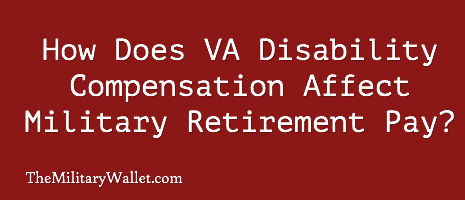If you have a Department of Veterans Affairs service-connected disability rating of 10% or higher, you are eligible to receive a monthly compensation check from the VA. The monthly compensation payments vary by your disability rating—and if your rating is 30% or higher, the rates increase, depending on the number of dependents you have filed on your claim.

You may be eligible to receive VA disability compensation even if you didn’t retire from the military. If you are retired from the military and are also eligible for VA disability compensation, determining how much you get paid — and from where — can seem complicated. Until 2004, it was against the law to receive full military retirement pay and VA disability compensation at the same time. Retirees had to choose which pay they wanted to receive, and if they chose to receive their VA disability compensation, those funds were deducted from their military retirement pay.
There have been two major changes to this law in the past decade, and some veterans may be eligible to receive their full military retirement pay along with their VA disability compensation. These laws are:
- Concurrent retirement disability pay (CRDP) (2004) applies to military retirees who have a combined VA disability rating of 50% or greater.
- Combat-related special compensation (CRSC) (2008) applies to military retirees who have a service-connected disability rating of at least 10% that stems from a combat-related incident.
It is possible to be eligible for both of these programs, but you can only receive the additional monetary compensation from one of them. Veterans who qualify for both plans will be given the choice of which they wish to receive when they apply for their benefits. You can also change your election if your situation changes. Concurrent retirement disability pay (CRDP) sends out open season letters annually each December; veterans must select their choice by the end of January.
Let’s examine your options if you are eligible for military retirement pay and VA disability compensation. There are several misconceptions about how VA disability compensation affects military retirement pay. So let’s take a look at some of those rumors and break them down so you have a clear understanding of how these forms of compensation work together.
Veterans: Are you under 90% rated?
Winning approval for military service-connected injuries and illnesses can be a challenging process. Be confident that you’re getting the compensation that you medically, legally, and ethically qualify for.
Answer a few quick questions to get the most accurate veteran disability rating that your conditions warrant here.
Comparing VA Disability Compensation and Military Retirement Pay
Military retirement pay and VA disability compensation are entirely separate forms of compensation. They are paid from different agencies and are paid from different buckets of money. They also represent two forms of compensation. Military retirement pay is a pension that is based on your years of service. VA disability compensation is a monetary award that is based on your decreased ability to perform work after leaving the military.
Taxable versus non-taxable income: Military retirement pay is taxable at the federal level and is taxed by most states (some states do not have an income tax or do not tax military retirement pay). VA disability compensation is considered non-taxable income by the federal government (I am not aware of any states that tax VA disability compensation). This has a big advantage: Dollar for dollar, VA disability compensation gives veterans more spending power than military retirement pay because VA compensation is never taxed.
Can I Get Both VA Disability and Retirement Pay?
Concurrent retirement and disability pay (CRDP) allows retired military members to receive both retirement pay and VA compensation. However, to best answer this question, we need to examine your disability rating. If you have a combined disability rating of 50% or greater, you should be eligible to receive CRDP. If you receive CRDP, you will receive your full military retirement pay along with your full VA disability compensation. There will be no reduction to your military retirement pay.
If you have a combined VA service-connected disability rating of 40% or lower, then you are not eligible for CRDP. However, if you have a service-connected disability that is considered a combat-related disability, then you may be eligible for combat-related special compensation (CRSC). CRSC also replaces the VA disability offset and will increase your total compensation, even if you don’t have a combined rating of at least 50%.
If your combined disability rating is 40% or lower and you do not have a combat-related disability, then your military retirement pay will be offset, or deducted, by the amount of VA service-connected disability compensation you receive.
Let’s take a look at these special conditions in more detail and run some numbers to show you how valuable these benefits are.
Concurrent Retirement Disability Pay (CRDP)
Concurrent Receipt Laws: Until 2004, the law prevented military retirees from receiving part or all of their military pay if they also received disability compensation from the VA. Military members had to choose which payment they wanted to receive: military retirement pay or VA disability compensation. If they chose to receive both forms of payment, they had to offset, or waive, a portion of their military retirement pay equal to the amount they received from the VA. It prevented service members from double-dipping and receiving compensation from both the VA and the military.
In 2004, the law changed, and military retirees were eligible to receive both military retirement pay and VA disability compensation, but only if they had a VA service-connected disability rating of 50% or higher.
Here is how the compensation breaks down if you are eligible to receive both types of compensation:
- VA disability rating of 40% or lower. Military retirees who choose to receive VA disability compensation will have their military retirement pay offset by the amount of compensation they receive from the VA. Most retirees choose to receive their VA disability compensation because it is tax-free income, while their military pension is taxed by the federal government and by most states. They still receive the same amount of total compensation they otherwise would have received; however, the VA compensation portion is tax-free, giving them more spending power.
- VA disability rating of 50% or more. Military retirees with a disability rating of greater than 50% are eligible to receive both payments under CRDP. They will receive their full military retirement pension, along with 100% of their VA disability compensation. They do not need to offset their military pay by the amount of the compensation they receive from the VA.
The difference between a disability rating of 40% and 50% can mean a difference of thousands of dollars per year because the difference comes in the form of the increased disability compensation at the higher rate, along with the full military pension that is not offset by the concurrent receipt laws.
Do Disabled Veterans Qualify for VA Home Loans?
Disabled veterans who have VA loan entitlement are eligible for a VA home loan. However, all active-duty military and veteran borrowers have multiple requirements to hit in order to fully qualify for a VA home loan, including meeting the service standards and a lender’s specific credit score minimum to residual income and acceptable debt-to-income ratio.
Check if you meet the official VA loan requirements here.
How is Military Retirement Pay Offset by VA Compensation?
If your VA disability rating is 40% or lower, your military retirement pay is offset by the amount of your VA compensation. In other words, a 40% disability rating doesn’t mean 40% of your retirement pay is tax-free. It means you receive tax-free compensation from the VA at the 40% rate, and your military retirement pay is deducted by that amount.
Let’s look at an example.
Let’s say our retiree earns a monthly retirement check of $2,000. Let’s also assume he has a VA service-connected disability rating of 40%, and he has one dependent (a spouse). His VA disability compensation would be $673.28 per month (2022 rates; see full rate chart here).
He would receive $673.28 from the VA, which would be tax-free. He would then receive $1,326.72 as his military retirement pay ($2,000 – $673.28 = $1,326.72).
The total amount still equals $2,000 per month. But $673.28 of that is tax-free income. The overall effect gives the veteran more spending power.
You can also see how this uniform method for computing the VA disability offset is easier than awarding retirees a percentage of their pay as tax-free.
The Value of Concurrent Receipts
The main benefit of the VA disability offset is receiving the tax-free pay from the VA. The final dollar amount is the same, but the tax-free portion gives veterans greater spending power.
But the amount would be much greater if veterans received both forms of compensation under concurrent retirement disability pay laws. The increase would mean the full value of the military retirement pay, plus the full value of the VA disability compensation. Going from a 40% rating ($673.28) to a 50% rating ($958.44) is huge. Not only does the VA disability compensation increase by $285.16 per month, but the $673.28 is not deducted from the military retirement pay. The net effect is this:
- 40% disability rating: $2,000 total ($1,326.72 taxable; $673.28 non-taxable)
- 50% disability rating: $2,958.44 total ($2,000 taxable; $958.44 non-taxable)
The difference is an increase of $11,501.28 per year, none of which is taxable income.
Learn more about concurrent retirement disability pay (CRDP):
- We have a full-length article about concurrent receipt, including qualifications, examples, and more.
- Here is a DFAS article about concurrent receipt.
Combat-Related Special Compensation (CRSC)
To qualify for combat-related special compensation (CRSC), you must have a service-connected disability rating that is considered combat-related. Here are a few other eligibility criteria:
- You must be a military retiree (active duty or reserves with 20 years of creditable service, Chapter 61 medically retired with fewer than 20 years of service, retired under Temporary Early Retirement Act (TERA) or retired under the Temporary Disabled Retirement List.
- You must have a VA service-connected disability rating of at least 10% that is considered to be combat-related.
- Your military retirement pay must currently be reduced by the VA disability offset.
The injury doesn’t have to be from direct combat. Disabilities may be considered combat-related for CRSC purposes if they are a direct result of:
- Armed conflict/combat: Direct or indirect wounds that happened during armed conflict.
- Hazardous duty: Demolition duty, diving, parachuting, aerial flight and more.
- An instrumentality of war: An injury sustained from exposure to an instrumentality of war, such as a weapon or weapon system specifically designed for military duty or warfare. This can include certain military combat vehicles, vessels, aircraft or an injury or sickness caused by exposure to fumes, gases or chemicals. Agent Orange exposure would qualify as an instrumentality of war.
- Simulated war: Activities such as military training, exercises, airborne ops, live-fire exercises, hand-to-hand combat training and more. This does not include standard physical training such as running, jogging or group sports activities.
Eligibility Dates: Anyone can be eligible as long as they meet the above criteria. This includes military retirees who have been retired for decades or those who retired last month. There is even the possibility of back pay; however, it can only be extended back to the effective dates of the laws, which are June 1, 2003, for those with 20 years of service, or January 1, 2008, for those who were medically retired under Chapter 61 with fewer than 20 years of service.
You must apply with your branch of service. Concurrent receipt is automatically applied by Defense Finance Accounting Service and the VA. The CRSC program is administered by each branch of the military. You will need to complete an application and send in supporting documentation to receive this benefit.
Will Concurrent Receipt Laws be Extended to Everyone?
In a perfect world, all military retirees who have VA service-connected disability ratings would be eligible to receive the disability pay in addition to their retirement pay. Unfortunately, the government budget isn’t limitless, and the current payment methods are being used to help control budgets. Concurrent receipt was phased in over a ten-year period, with veterans receiving incrementally larger amounts of VA compensation added to their retirement pay each year. If the government were to open concurrent receipt to everyone, they would likely do something similar, as it would otherwise be a massive budget increase.
Will Concurrent Receipt Laws Change?
Several military organizations and lobbying groups are working hard to get the concurrent receipt laws extended to all retirees, regardless of their disability ratings, but it has yet to be approved by Congress. The Military Officers Association of America (MOAA) has repeatedly attempted to get the law repealed that requires military retirees to forfeit their military retirement pay to receive their VA disability pay. You can read about their most-recent efforts here.




Comments:
About the comments on this site:
These responses are not provided or commissioned by the bank advertiser. Responses have not been reviewed, approved or otherwise endorsed by the bank advertiser. It is not the bank advertiser’s responsibility to ensure all posts and/or questions are answered.
Joseph L.Lyons BMC E-7 says
I am a retired Vietnam veteran with 22 years service and a 90%= va combat related disability. I don’t understand if I am eligible for Crsc.
Ryan Guina says
Joseph, here is a full overview of the CRSC program. I recommend reading it to better understand the benefit. In order to become eligible, you must have a combat-related service connected disability rating (which you have). Then you must apply through your branch of service. That said, CRSC is designed to replace the VA disability compensation offset that applies to military retirees with a VA disability rating of less than 50%. With a disability rating of less than 50%, DFAS withholds an amount of retirement pay equal to the amount of VA disability compensation, thus “offsetting” the VA disability pay. Once you reach 50% VA disability rating, you are eligible for Concurrent Receipt, meaning you receive both full military retirement pay and VA disability compensation. So even if you are eligible for RSC, your 90% rating may not make it necessary. I recommend speaking with a veterans benefits counselor to see if applying for CRSC will be worth your time. Best wishes!
Kyle wood says
Hello I have a questions. I am part of the PDRL( permanent disability retirement list) and 100% P&T from the va but with less of 20 years of service. How do that apply to CRSC and CDRP? Will I be able to get both or one or non at all.
Paul Wallace says
I am retired military and 100% VA disabled. I was informed that because of my 100% status in conjunction with being retired I qualify to have my military pension tax exempt. IAW department of treasury publication 525. Is that correct?
Ryan Guina says
Paul, all VA disability compensation is tax-exempt. Many states also exempt military retirement pay from taxes. However, I am not aware of any rules that exempt military retirement pay at the federal level. I recommend working with a tax professional or contacting the IRS for verification. Best wishes!
Walter Locke says
Hi, my VA disability rating was recently increased from 40 to 60%. Will I lose my CRSC pay? Also, will I receive back pay from VA what was deducted from my Military pay? Thanks.
Ryan Guina says
Walter, I recommend contacting the VA regarding your CRSC pay. They will be able to assist you with that question. Regarding back pay – the VA will usually increase your rating retroactive to the date you filed your claim, and they provide back pay to that date as well. Since your rating would retroactively increase to 60%, then you should have a case for getting back pay from your military retirement pay as well. I don’t know if this is automatically communicated from the VA to DFAS, or if you have to create a claim. I would be proactive and contact both the VA and DFAS to determine which steps, if any, you need to take. Best wishes!
Luticia Fiorito says
My father is 87, Vietnam Veteran, with a debilitating neurological disease. How do I get him evaluated to connect his disease to service so he can receive the disability payment as well. He would definitely minimally be 50% or higher. Thank you. Ssgt Luticia Smith-Fiorito
Ryan Guina says
Luticia, I’m sorry to hear about your father’s health condition. I recommend he contact a Veterans Service Organization, such as his county Veterans Affairs office or the DAV, AMVETS, American Legion, or a similar organization. These organizations have trained representatives who can assist your father in filing for a disability claim. Additionally, many neurological conditions have a presumptive connection if the veteran was exposed to Agent Orange or other chemicals through their military service. I hope this points you in the right direction.